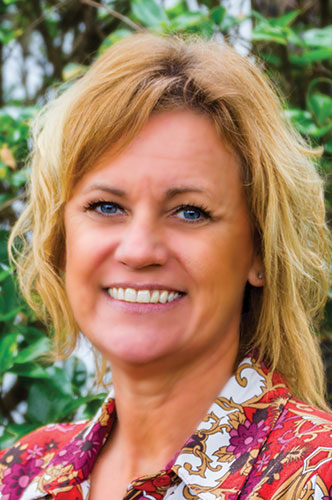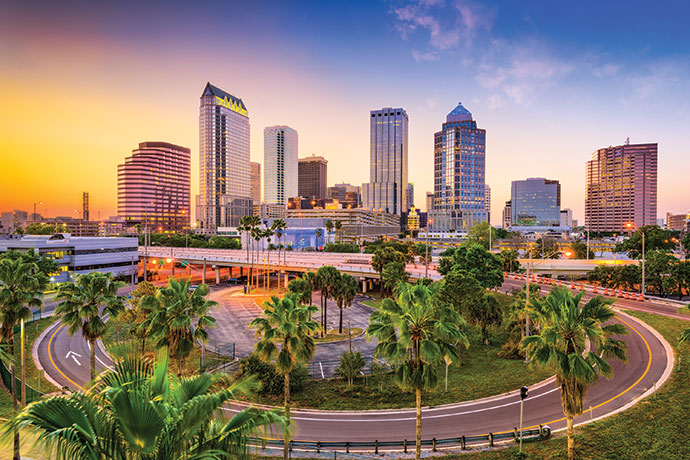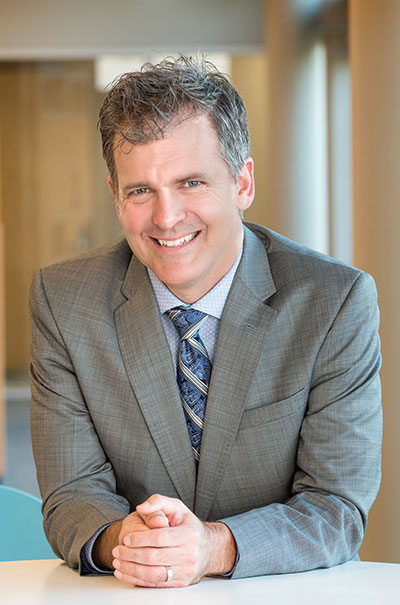What do you do when you know you’re onto a big idea but can’t make the costs work? If you’re Rachel Carpenter and Joey French, you look for a better spot to build your business.
In 2013, the co-founders of fintech startup Intrinio packed up their boxes in Chicago and set out for St. Petersburg, Florida, where the weather is warm and the costs are low.

The company that specializes in creating an accessible and affordable marketplace for financial data is no stranger to data analysis, so when Intrinio crunched the numbers, Florida made sense in more ways than one.
“Joey and I met at the University of Wisconsin in Madison. We were trying to build an app for the financial sector,” says Carpenter, CEO of Intrinio. “We graduated and taught ourselves how to program. We built a website app that allows you to value stock and tells you whether to buy or sell. It is all powered by data. The problem was that we had to call all the big data vendors and they were giving us quotes of $60,000 to $70,000 a month. We could not afford that.”
Couple that with the costs of doing business in Chicago, and the startup founders were left with a dilemma — either go broke trying to make their dream work in Chicago or move their operation to someplace a lot more affordable.
They chose the latter, and the ensuing history is a case study in how Florida’s business climate breeds entrepreneurs, and how entrepreneurs respond in kind.
According to the Kauffman Foundation Early-Stage Entrepreneurship Index, Florida ranks behind only California and Missouri among the best states for entrepreneurs. Florida also ranks third in the nation in the rate of entrepreneurs as a percent of population, and fifth in the average number of jobs created by startups in their first year.
The Tax Foundation, meanwhile, recently ranked Florida as having the fourth-best state business tax climate in the nation and overall best climate for individual taxes.
Finding the Midwest in the South
Carpenter says they knew their idea would work when they took the leap of faith and relocated their business to St. Pete. “We got really frustrated back in 2013, and that anger became our fuel,” she says. “We wanted to make data more affordable and accessible for the financial industry. So we raised some capital and moved to Florida.”
She says they chose St. Pete because “we fell in love with the area. Both of our families had moved here to retire, but we knew we could go anywhere in the world. Once we got here to St. Pete, we really started programming and growing. We have 14 employees now in downtown St. Pete. We are in a growth stage and we are raising more capital. We absolutely love the area.”

“They (second-stage businesses) represent 8 percent of the small business population in Florida, but they generate over 30 percent of the jobs.”
Carpenter cites several location assets as critical to the company’s future: low costs, inviting climate for recruiting talent, vibrant arts and culture scene, a pro-business government, an accessible airport with direct flights to key markets, and “a Midwestern mentality” that is conducive to growing a business.
St. Pete may be in the South, but Carpenter found that, like her parents, many of the residents are Midwestern transplants. “Building a company is never easy, but it is very easy to attract talent here because so many people want to come here,” she adds. “The outdoor activities are phenomenal, and it is an extremely affordable place to live and work. We have the capacity to add five to 10 more people, but we will soon need to find larger space somewhere in downtown St. Pete. We plan to stay here for a long time.”
10 Best Places to Start a Business in Florida
- Maitland
- Doral
- Naples
- Palatka
- Sebring
- Coral Gables
- Longwood
- Stuart
- Orange City
- Lake Mary
Carpenter may soon have a lot of company, as word is getting out that Florida welcomes entrepreneurs. The Florida Chamber recently predicted that the state would add 150,000 new jobs this year, and the organization known as GrowFL is a big reason why. A state program designed to take successful companies to the next level, GrowFL is expected to generate $4.72 billion in additional gross domestic product over the next decade, according to a report by Florida TaxWatch.
By 2027, the report states, GrowFL will help companies in the Sunshine State create 43,794 private-sector, non-farm jobs with an average annual salary of $97,815. This will produce $4.61 billion in additional personal income for Floridians and generate $345.14 million in additional state tax receipts, says TaxWatch.
Tammie Sweet, director of GrowFL, says the Florida Legislature created GrowFL in 2009 to support the economy during the recession. “They looked at this program to help support a segment of the business population where they saw a need: second-stage businesses with a million to $50 million in revenue,” she says. “They represent 8 percent of the small business population in Florida, but they generate over 30 percent of the jobs.”
Through a partnership with the Edward Lowe Foundation of Michigan, GrowFL helps these companies with their revenue needs by helping them find expansion opportunities that bring more revenue to Florida. “We help the CEO learn how to start shedding tasks to focus on the most important things and start hiring other people,” Sweet says. “We provide a support system for the CEO.”
Over the course of the program’s nine years, it has recognized 400 firms as Florida Companies to Watch. These include high-growth firms like Sarasota Medical Products Inc., 3D Digital, A1A Solar Contracting, AdRizer, Big Top Brewing Company LLC, Global Safety Management, Hydro-Dyne Engineering, Inspired Technologies, JAX Refrigeration and Marion Precision Tool Inc.
A Scary Proposition? Not Really
Many of these firms are finding their way to the Tampa Bay Area, with St. Pete in Pinellas County serving as prime breeding ground. Other disruptive entrepreneurs in St. Pete include Presence, which is changing the way colleges and universities maximize student engagement and success; The Penny Hoarder, which provides online financial advice for the average Joe; Inside Out Sales Innovation Labs, which is changing the way tech companies sell their products; and Callyo, which helps law enforcement fight human trafficking.
One of these upstarts is even working on the scarier side of business — iHorror.com. Founded a few years ago in St. Pete, this Bay Area film and entertainment media company already has 4.3 million Facebook followers and is making headway in the original short film area.
The company is releasing two new projects this year: Monstrum, the first movie directed by website founder and company CEO Anthony Pernicka; and Terror Tales, a 12-part anthology series directed by Dominic Smith of Tampa.
“The idea is to have films that are consumable, 5-minute or less stories. We’ll grow from there,” Pernicka told the Tampa Bay Times.
J.P. DuBuque, president of the Greater St. Petersburg Area Economic Development Corp., says startups love St. Pete because they find a welcoming environment that provides both low costs and an abundance of opportunities for quality networking with likeminded people.

Carpenter agrees. That’s why she’s helped start an incubator-like program to train and encourage developers of new apps. “I’ve been here five or six years with the business,” she says. “What I saw happening was incredible — an influx of young people, bars, restaurants, artists, musicians and entrepreneurs. The average age in St. Pete is going down. If you’re looking for a value opportunity, this is the place to be.”
About 150 miles north of St. Pete, another organization is lending a hand to startups. It’s called UF Innovate, the commercialization arm of the Office of Technology Licensing at the University of Florida in Gainesville.
Jim O’Connell, assistant vice president for commercialization and director of UF Innovate, launched a couple of successful startups himself before taking over this new gig, and he says the rate of entrepreneurship in Florida is under-appreciated by most outside the state.

“UF has done less than a stellar job of marketing ourselves,” he says. “We are on par with Cornell and Penn in the first gene therapy approved by the FDA. It is for a very rare genetic disease that makes children go blind. It literally makes children see again. People in the industry salivate over this kind of stuff, but even our own faculty don’t know about it. No one has any idea that UF is doing this kind of work.”
In fact, notes O’Connell, UF ranks No. 2 in total deal flow in the country for the last two years and has ranked in the top 10 for the last 10 years. “We are driving a lot of volume,” he says. “We will do close to $900 million in research expenditures this year. We did $867 million last year. We are being tasked to get over a billion dollars so that we can be a top five research university in the U.S.”
Demand is growing too. The school’s Sid Martin Incubator is full and has a waiting list of startups that want to get in. “We are looking to expand the capabilities,” says O’Connell. “Our long-term goal is to keep these companies in Florida after they’re done incubating. Even when they’re successful, most startups don’t have enough money to build their own building when they’re at five to 10 employees, or even afford their next lease. Often, their only option is to leave the state. We want to change that. If we can keep these companies for a couple more years and help them grow to 20 or 30 people, it’s very hard for them to move.”

